Ford Marketing Report: Environment, Segmentation & Strategy - MKTG100
VerifiedAdded on 2023/06/13
|11
|2956
|296
Report
AI Summary
This report provides a comprehensive business analysis of Ford Motor Company, focusing on its operations and marketing strategies, particularly in the Australian market. It identifies relevant internal and external factors, including strengths, weaknesses, opportunities, and threats, within the political, economic, social, technological, environmental, and legal (PESTEL) framework. The report evaluates Ford's segmentation, target market, and positioning strategies, noting its focus on high-income and upper-middle-class families, as well as younger generations. It also examines Ford's marketing mix, including product, promotion, and pricing strategies. The report concludes with recommendations for improving Ford's market penetration, particularly in developing Asian markets, and suggests strategies for product innovation and customer service enhancement.
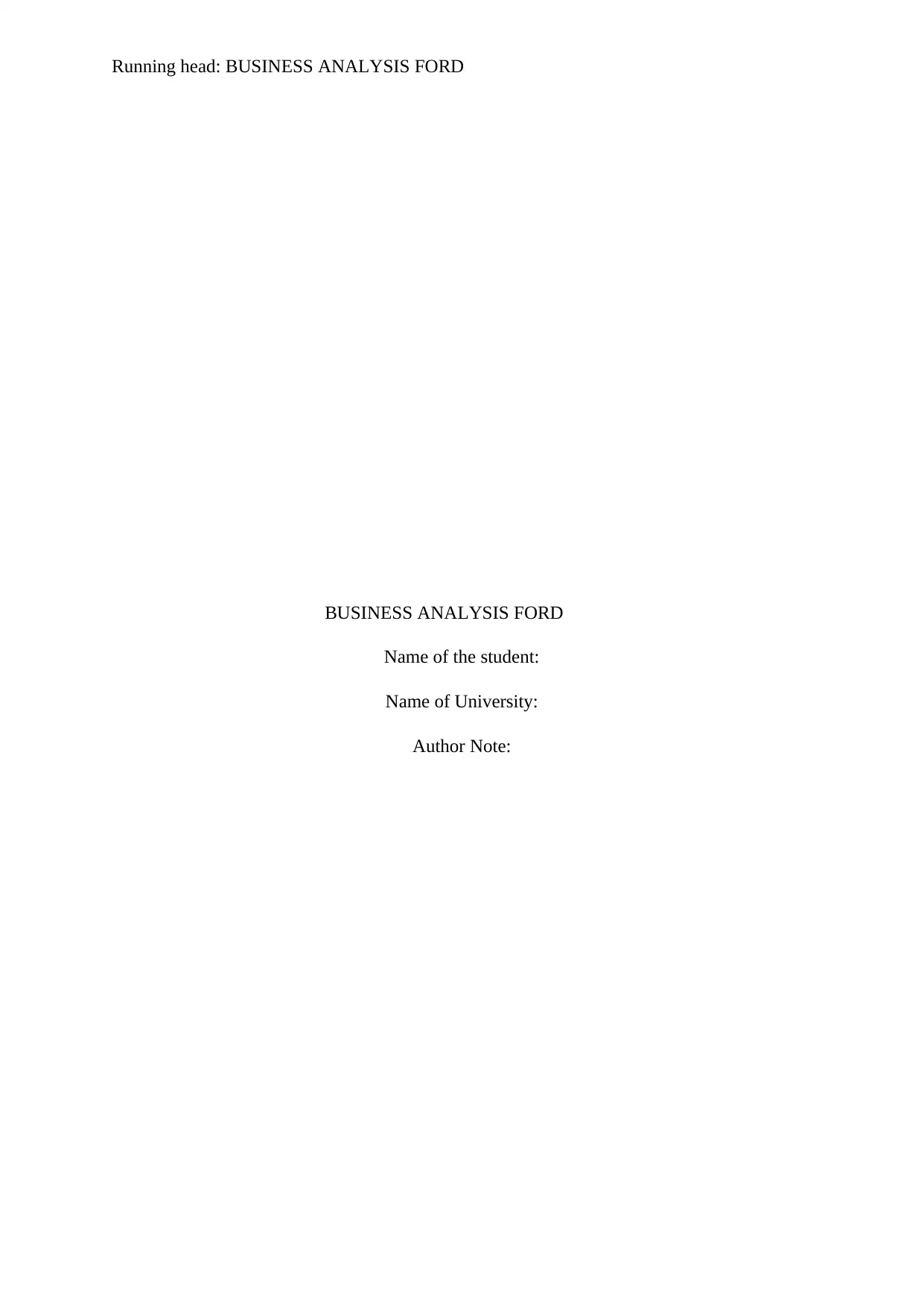
Running head: BUSINESS ANALYSIS FORD
BUSINESS ANALYSIS FORD
Name of the student:
Name of University:
Author Note:
BUSINESS ANALYSIS FORD
Name of the student:
Name of University:
Author Note:
Paraphrase This Document
Need a fresh take? Get an instant paraphrase of this document with our AI Paraphraser
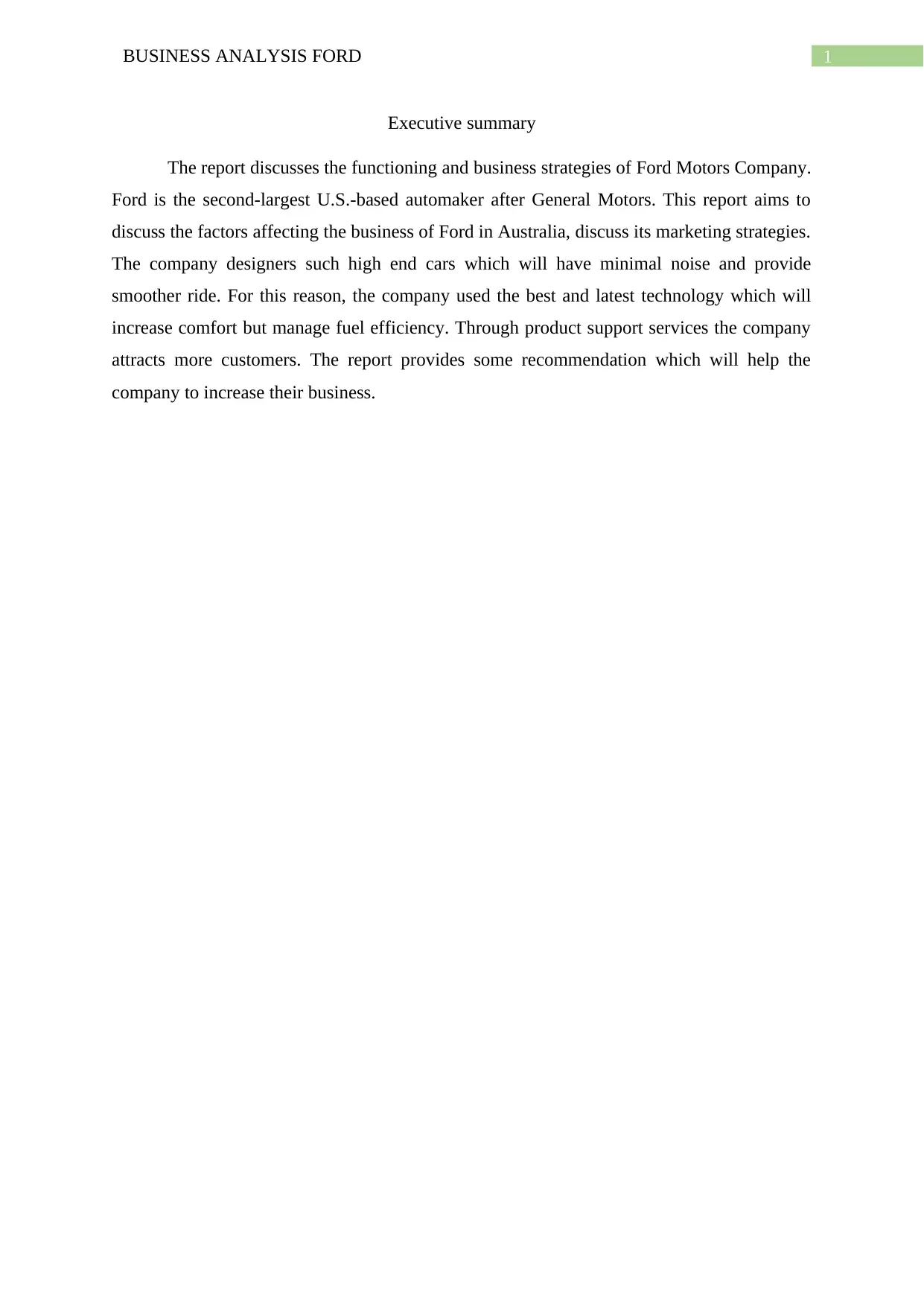
1BUSINESS ANALYSIS FORD
Executive summary
The report discusses the functioning and business strategies of Ford Motors Company.
Ford is the second-largest U.S.-based automaker after General Motors. This report aims to
discuss the factors affecting the business of Ford in Australia, discuss its marketing strategies.
The company designers such high end cars which will have minimal noise and provide
smoother ride. For this reason, the company used the best and latest technology which will
increase comfort but manage fuel efficiency. Through product support services the company
attracts more customers. The report provides some recommendation which will help the
company to increase their business.
Executive summary
The report discusses the functioning and business strategies of Ford Motors Company.
Ford is the second-largest U.S.-based automaker after General Motors. This report aims to
discuss the factors affecting the business of Ford in Australia, discuss its marketing strategies.
The company designers such high end cars which will have minimal noise and provide
smoother ride. For this reason, the company used the best and latest technology which will
increase comfort but manage fuel efficiency. Through product support services the company
attracts more customers. The report provides some recommendation which will help the
company to increase their business.
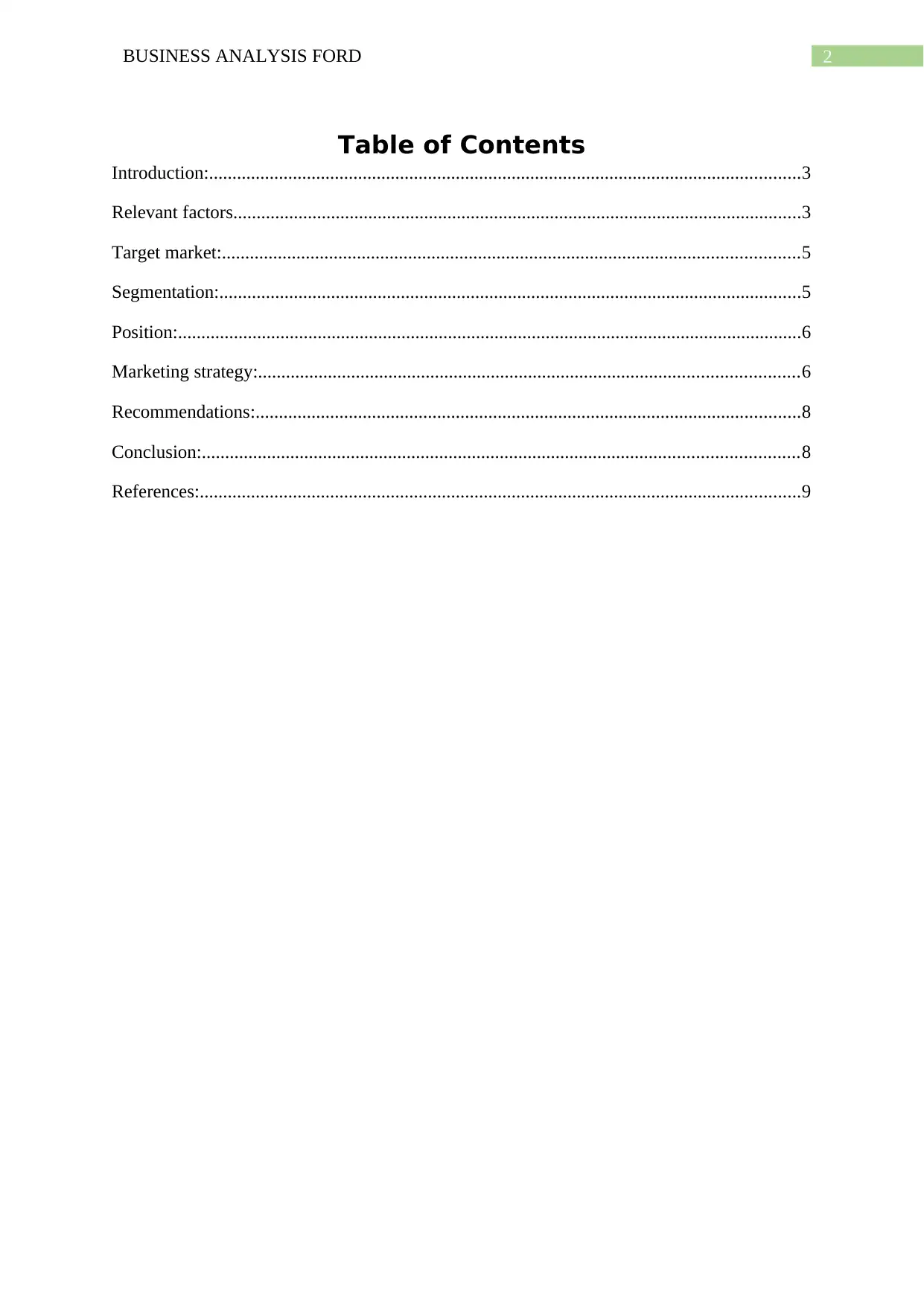
2BUSINESS ANALYSIS FORD
Table of Contents
Introduction:...............................................................................................................................3
Relevant factors..........................................................................................................................3
Target market:............................................................................................................................5
Segmentation:.............................................................................................................................5
Position:......................................................................................................................................6
Marketing strategy:....................................................................................................................6
Recommendations:.....................................................................................................................8
Conclusion:................................................................................................................................8
References:.................................................................................................................................9
Table of Contents
Introduction:...............................................................................................................................3
Relevant factors..........................................................................................................................3
Target market:............................................................................................................................5
Segmentation:.............................................................................................................................5
Position:......................................................................................................................................6
Marketing strategy:....................................................................................................................6
Recommendations:.....................................................................................................................8
Conclusion:................................................................................................................................8
References:.................................................................................................................................9
⊘ This is a preview!⊘
Do you want full access?
Subscribe today to unlock all pages.

Trusted by 1+ million students worldwide
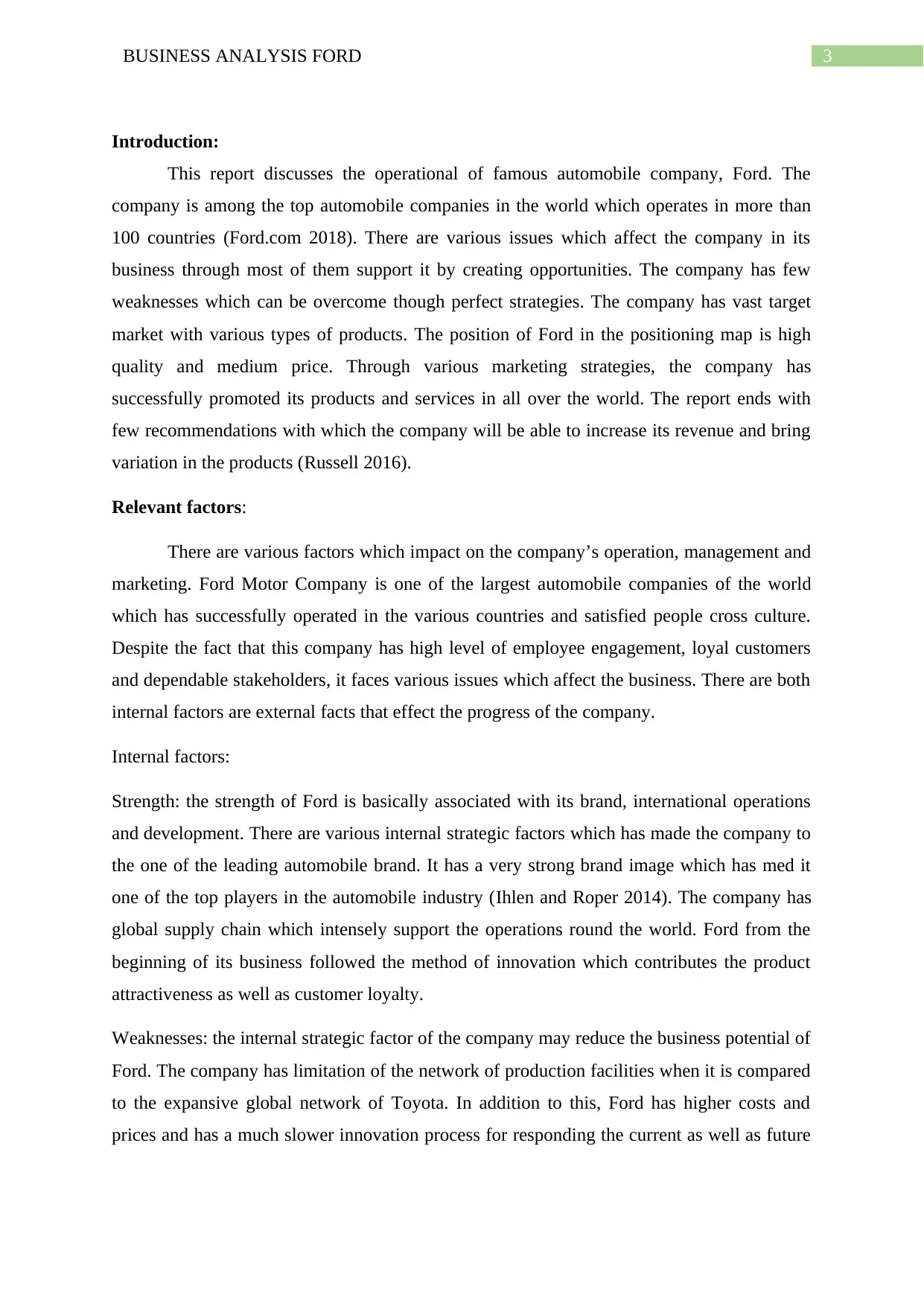
3BUSINESS ANALYSIS FORD
Introduction:
This report discusses the operational of famous automobile company, Ford. The
company is among the top automobile companies in the world which operates in more than
100 countries (Ford.com 2018). There are various issues which affect the company in its
business through most of them support it by creating opportunities. The company has few
weaknesses which can be overcome though perfect strategies. The company has vast target
market with various types of products. The position of Ford in the positioning map is high
quality and medium price. Through various marketing strategies, the company has
successfully promoted its products and services in all over the world. The report ends with
few recommendations with which the company will be able to increase its revenue and bring
variation in the products (Russell 2016).
Relevant factors:
There are various factors which impact on the company’s operation, management and
marketing. Ford Motor Company is one of the largest automobile companies of the world
which has successfully operated in the various countries and satisfied people cross culture.
Despite the fact that this company has high level of employee engagement, loyal customers
and dependable stakeholders, it faces various issues which affect the business. There are both
internal factors are external facts that effect the progress of the company.
Internal factors:
Strength: the strength of Ford is basically associated with its brand, international operations
and development. There are various internal strategic factors which has made the company to
the one of the leading automobile brand. It has a very strong brand image which has med it
one of the top players in the automobile industry (Ihlen and Roper 2014). The company has
global supply chain which intensely support the operations round the world. Ford from the
beginning of its business followed the method of innovation which contributes the product
attractiveness as well as customer loyalty.
Weaknesses: the internal strategic factor of the company may reduce the business potential of
Ford. The company has limitation of the network of production facilities when it is compared
to the expansive global network of Toyota. In addition to this, Ford has higher costs and
prices and has a much slower innovation process for responding the current as well as future
Introduction:
This report discusses the operational of famous automobile company, Ford. The
company is among the top automobile companies in the world which operates in more than
100 countries (Ford.com 2018). There are various issues which affect the company in its
business through most of them support it by creating opportunities. The company has few
weaknesses which can be overcome though perfect strategies. The company has vast target
market with various types of products. The position of Ford in the positioning map is high
quality and medium price. Through various marketing strategies, the company has
successfully promoted its products and services in all over the world. The report ends with
few recommendations with which the company will be able to increase its revenue and bring
variation in the products (Russell 2016).
Relevant factors:
There are various factors which impact on the company’s operation, management and
marketing. Ford Motor Company is one of the largest automobile companies of the world
which has successfully operated in the various countries and satisfied people cross culture.
Despite the fact that this company has high level of employee engagement, loyal customers
and dependable stakeholders, it faces various issues which affect the business. There are both
internal factors are external facts that effect the progress of the company.
Internal factors:
Strength: the strength of Ford is basically associated with its brand, international operations
and development. There are various internal strategic factors which has made the company to
the one of the leading automobile brand. It has a very strong brand image which has med it
one of the top players in the automobile industry (Ihlen and Roper 2014). The company has
global supply chain which intensely support the operations round the world. Ford from the
beginning of its business followed the method of innovation which contributes the product
attractiveness as well as customer loyalty.
Weaknesses: the internal strategic factor of the company may reduce the business potential of
Ford. The company has limitation of the network of production facilities when it is compared
to the expansive global network of Toyota. In addition to this, Ford has higher costs and
prices and has a much slower innovation process for responding the current as well as future
Paraphrase This Document
Need a fresh take? Get an instant paraphrase of this document with our AI Paraphraser
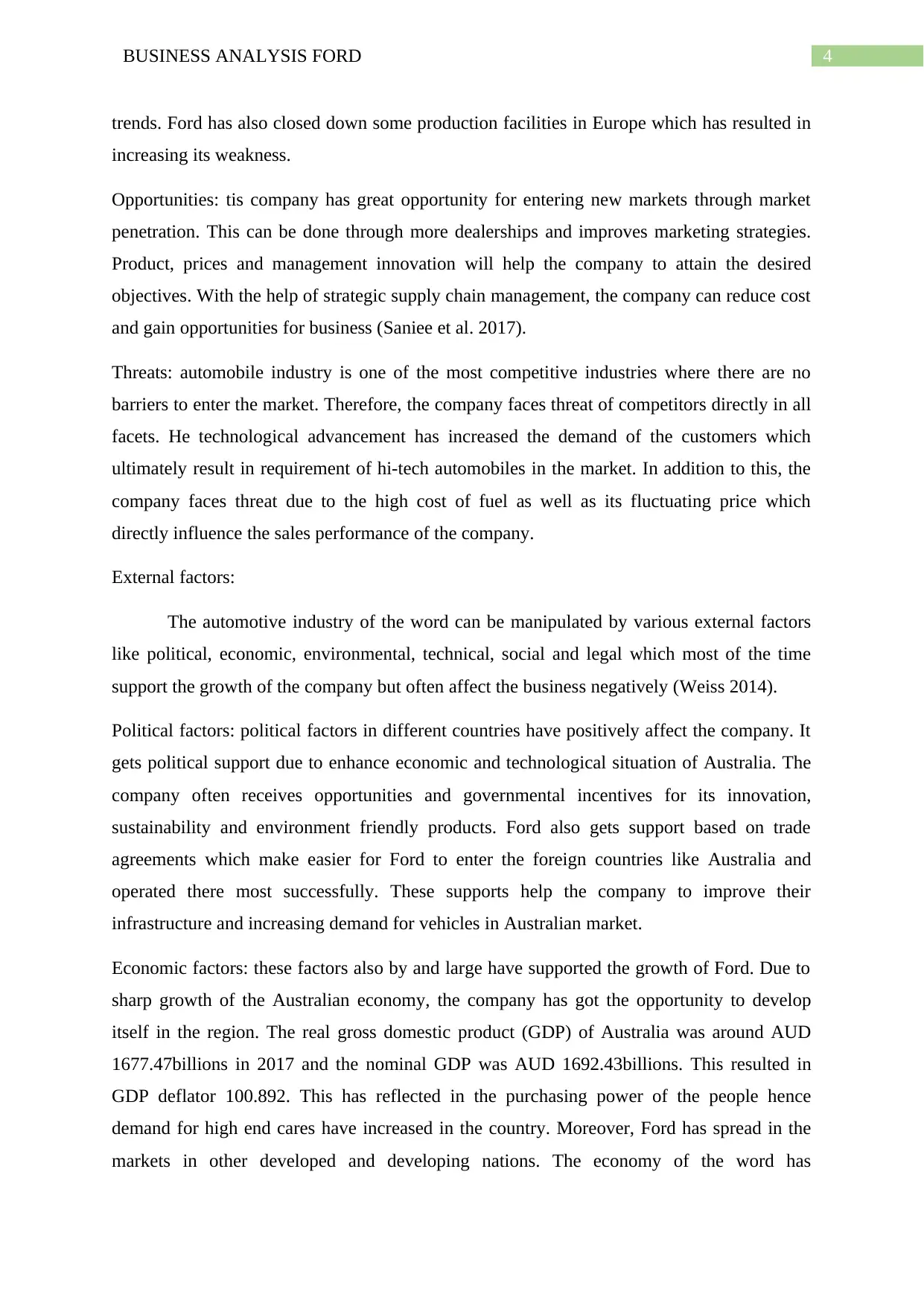
4BUSINESS ANALYSIS FORD
trends. Ford has also closed down some production facilities in Europe which has resulted in
increasing its weakness.
Opportunities: tis company has great opportunity for entering new markets through market
penetration. This can be done through more dealerships and improves marketing strategies.
Product, prices and management innovation will help the company to attain the desired
objectives. With the help of strategic supply chain management, the company can reduce cost
and gain opportunities for business (Saniee et al. 2017).
Threats: automobile industry is one of the most competitive industries where there are no
barriers to enter the market. Therefore, the company faces threat of competitors directly in all
facets. He technological advancement has increased the demand of the customers which
ultimately result in requirement of hi-tech automobiles in the market. In addition to this, the
company faces threat due to the high cost of fuel as well as its fluctuating price which
directly influence the sales performance of the company.
External factors:
The automotive industry of the word can be manipulated by various external factors
like political, economic, environmental, technical, social and legal which most of the time
support the growth of the company but often affect the business negatively (Weiss 2014).
Political factors: political factors in different countries have positively affect the company. It
gets political support due to enhance economic and technological situation of Australia. The
company often receives opportunities and governmental incentives for its innovation,
sustainability and environment friendly products. Ford also gets support based on trade
agreements which make easier for Ford to enter the foreign countries like Australia and
operated there most successfully. These supports help the company to improve their
infrastructure and increasing demand for vehicles in Australian market.
Economic factors: these factors also by and large have supported the growth of Ford. Due to
sharp growth of the Australian economy, the company has got the opportunity to develop
itself in the region. The real gross domestic product (GDP) of Australia was around AUD
1677.47billions in 2017 and the nominal GDP was AUD 1692.43billions. This resulted in
GDP deflator 100.892. This has reflected in the purchasing power of the people hence
demand for high end cares have increased in the country. Moreover, Ford has spread in the
markets in other developed and developing nations. The economy of the word has
trends. Ford has also closed down some production facilities in Europe which has resulted in
increasing its weakness.
Opportunities: tis company has great opportunity for entering new markets through market
penetration. This can be done through more dealerships and improves marketing strategies.
Product, prices and management innovation will help the company to attain the desired
objectives. With the help of strategic supply chain management, the company can reduce cost
and gain opportunities for business (Saniee et al. 2017).
Threats: automobile industry is one of the most competitive industries where there are no
barriers to enter the market. Therefore, the company faces threat of competitors directly in all
facets. He technological advancement has increased the demand of the customers which
ultimately result in requirement of hi-tech automobiles in the market. In addition to this, the
company faces threat due to the high cost of fuel as well as its fluctuating price which
directly influence the sales performance of the company.
External factors:
The automotive industry of the word can be manipulated by various external factors
like political, economic, environmental, technical, social and legal which most of the time
support the growth of the company but often affect the business negatively (Weiss 2014).
Political factors: political factors in different countries have positively affect the company. It
gets political support due to enhance economic and technological situation of Australia. The
company often receives opportunities and governmental incentives for its innovation,
sustainability and environment friendly products. Ford also gets support based on trade
agreements which make easier for Ford to enter the foreign countries like Australia and
operated there most successfully. These supports help the company to improve their
infrastructure and increasing demand for vehicles in Australian market.
Economic factors: these factors also by and large have supported the growth of Ford. Due to
sharp growth of the Australian economy, the company has got the opportunity to develop
itself in the region. The real gross domestic product (GDP) of Australia was around AUD
1677.47billions in 2017 and the nominal GDP was AUD 1692.43billions. This resulted in
GDP deflator 100.892. This has reflected in the purchasing power of the people hence
demand for high end cares have increased in the country. Moreover, Ford has spread in the
markets in other developed and developing nations. The economy of the word has
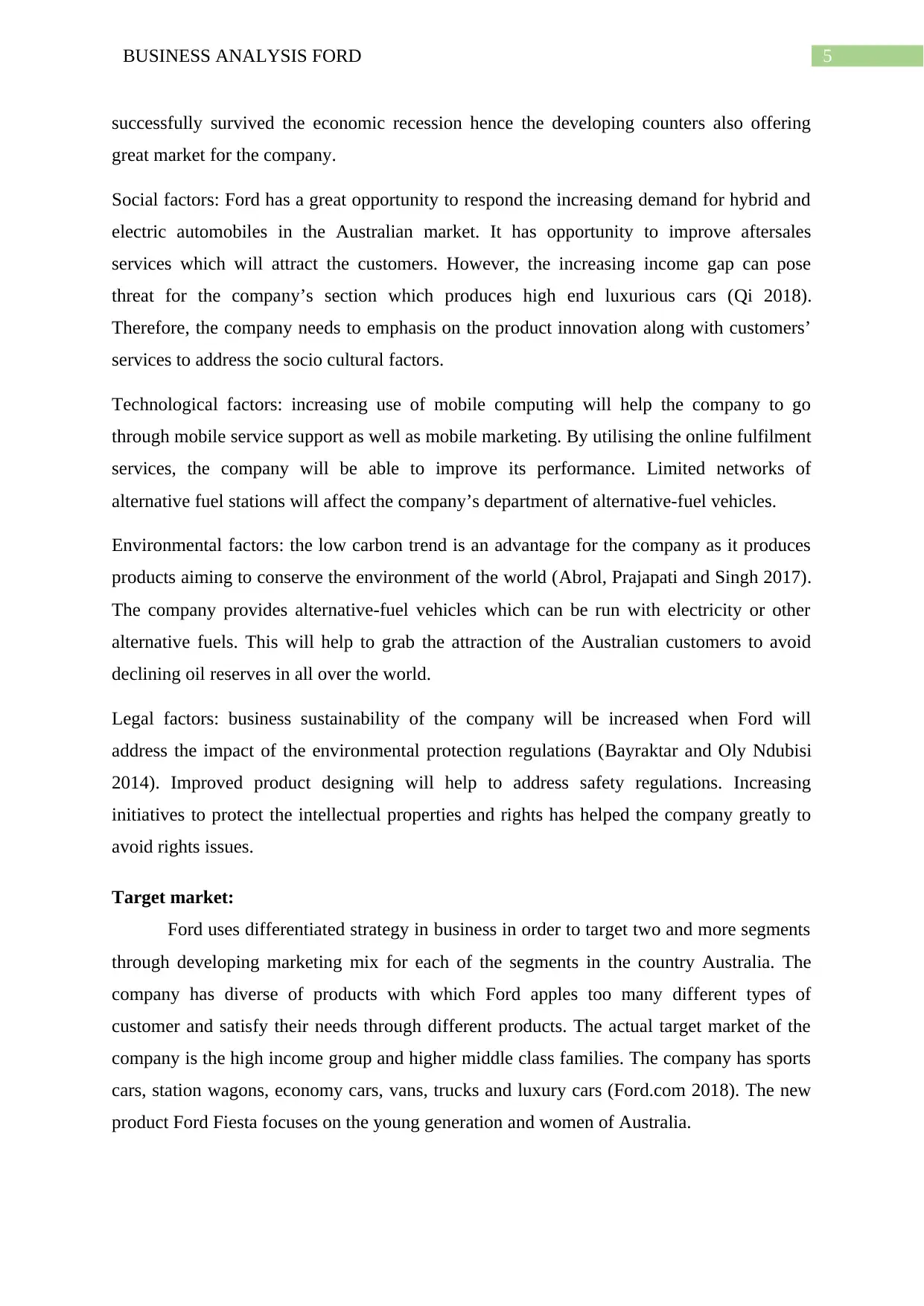
5BUSINESS ANALYSIS FORD
successfully survived the economic recession hence the developing counters also offering
great market for the company.
Social factors: Ford has a great opportunity to respond the increasing demand for hybrid and
electric automobiles in the Australian market. It has opportunity to improve aftersales
services which will attract the customers. However, the increasing income gap can pose
threat for the company’s section which produces high end luxurious cars (Qi 2018).
Therefore, the company needs to emphasis on the product innovation along with customers’
services to address the socio cultural factors.
Technological factors: increasing use of mobile computing will help the company to go
through mobile service support as well as mobile marketing. By utilising the online fulfilment
services, the company will be able to improve its performance. Limited networks of
alternative fuel stations will affect the company’s department of alternative-fuel vehicles.
Environmental factors: the low carbon trend is an advantage for the company as it produces
products aiming to conserve the environment of the world (Abrol, Prajapati and Singh 2017).
The company provides alternative-fuel vehicles which can be run with electricity or other
alternative fuels. This will help to grab the attraction of the Australian customers to avoid
declining oil reserves in all over the world.
Legal factors: business sustainability of the company will be increased when Ford will
address the impact of the environmental protection regulations (Bayraktar and Oly Ndubisi
2014). Improved product designing will help to address safety regulations. Increasing
initiatives to protect the intellectual properties and rights has helped the company greatly to
avoid rights issues.
Target market:
Ford uses differentiated strategy in business in order to target two and more segments
through developing marketing mix for each of the segments in the country Australia. The
company has diverse of products with which Ford apples too many different types of
customer and satisfy their needs through different products. The actual target market of the
company is the high income group and higher middle class families. The company has sports
cars, station wagons, economy cars, vans, trucks and luxury cars (Ford.com 2018). The new
product Ford Fiesta focuses on the young generation and women of Australia.
successfully survived the economic recession hence the developing counters also offering
great market for the company.
Social factors: Ford has a great opportunity to respond the increasing demand for hybrid and
electric automobiles in the Australian market. It has opportunity to improve aftersales
services which will attract the customers. However, the increasing income gap can pose
threat for the company’s section which produces high end luxurious cars (Qi 2018).
Therefore, the company needs to emphasis on the product innovation along with customers’
services to address the socio cultural factors.
Technological factors: increasing use of mobile computing will help the company to go
through mobile service support as well as mobile marketing. By utilising the online fulfilment
services, the company will be able to improve its performance. Limited networks of
alternative fuel stations will affect the company’s department of alternative-fuel vehicles.
Environmental factors: the low carbon trend is an advantage for the company as it produces
products aiming to conserve the environment of the world (Abrol, Prajapati and Singh 2017).
The company provides alternative-fuel vehicles which can be run with electricity or other
alternative fuels. This will help to grab the attraction of the Australian customers to avoid
declining oil reserves in all over the world.
Legal factors: business sustainability of the company will be increased when Ford will
address the impact of the environmental protection regulations (Bayraktar and Oly Ndubisi
2014). Improved product designing will help to address safety regulations. Increasing
initiatives to protect the intellectual properties and rights has helped the company greatly to
avoid rights issues.
Target market:
Ford uses differentiated strategy in business in order to target two and more segments
through developing marketing mix for each of the segments in the country Australia. The
company has diverse of products with which Ford apples too many different types of
customer and satisfy their needs through different products. The actual target market of the
company is the high income group and higher middle class families. The company has sports
cars, station wagons, economy cars, vans, trucks and luxury cars (Ford.com 2018). The new
product Ford Fiesta focuses on the young generation and women of Australia.
⊘ This is a preview!⊘
Do you want full access?
Subscribe today to unlock all pages.

Trusted by 1+ million students worldwide
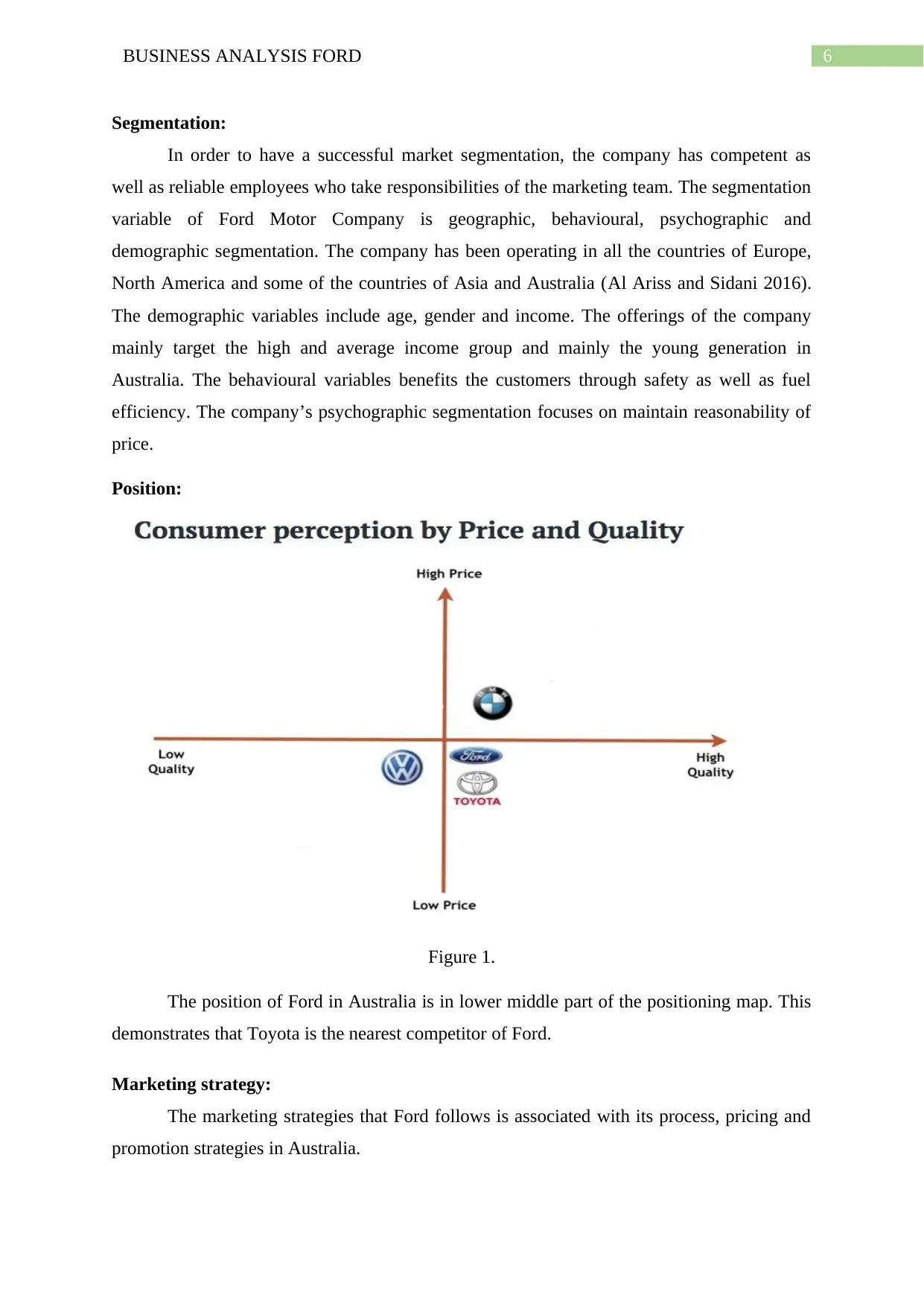
6BUSINESS ANALYSIS FORD
Segmentation:
In order to have a successful market segmentation, the company has competent as
well as reliable employees who take responsibilities of the marketing team. The segmentation
variable of Ford Motor Company is geographic, behavioural, psychographic and
demographic segmentation. The company has been operating in all the countries of Europe,
North America and some of the countries of Asia and Australia (Al Ariss and Sidani 2016).
The demographic variables include age, gender and income. The offerings of the company
mainly target the high and average income group and mainly the young generation in
Australia. The behavioural variables benefits the customers through safety as well as fuel
efficiency. The company’s psychographic segmentation focuses on maintain reasonability of
price.
Position:
Figure 1.
The position of Ford in Australia is in lower middle part of the positioning map. This
demonstrates that Toyota is the nearest competitor of Ford.
Marketing strategy:
The marketing strategies that Ford follows is associated with its process, pricing and
promotion strategies in Australia.
Segmentation:
In order to have a successful market segmentation, the company has competent as
well as reliable employees who take responsibilities of the marketing team. The segmentation
variable of Ford Motor Company is geographic, behavioural, psychographic and
demographic segmentation. The company has been operating in all the countries of Europe,
North America and some of the countries of Asia and Australia (Al Ariss and Sidani 2016).
The demographic variables include age, gender and income. The offerings of the company
mainly target the high and average income group and mainly the young generation in
Australia. The behavioural variables benefits the customers through safety as well as fuel
efficiency. The company’s psychographic segmentation focuses on maintain reasonability of
price.
Position:
Figure 1.
The position of Ford in Australia is in lower middle part of the positioning map. This
demonstrates that Toyota is the nearest competitor of Ford.
Marketing strategy:
The marketing strategies that Ford follows is associated with its process, pricing and
promotion strategies in Australia.
Paraphrase This Document
Need a fresh take? Get an instant paraphrase of this document with our AI Paraphraser
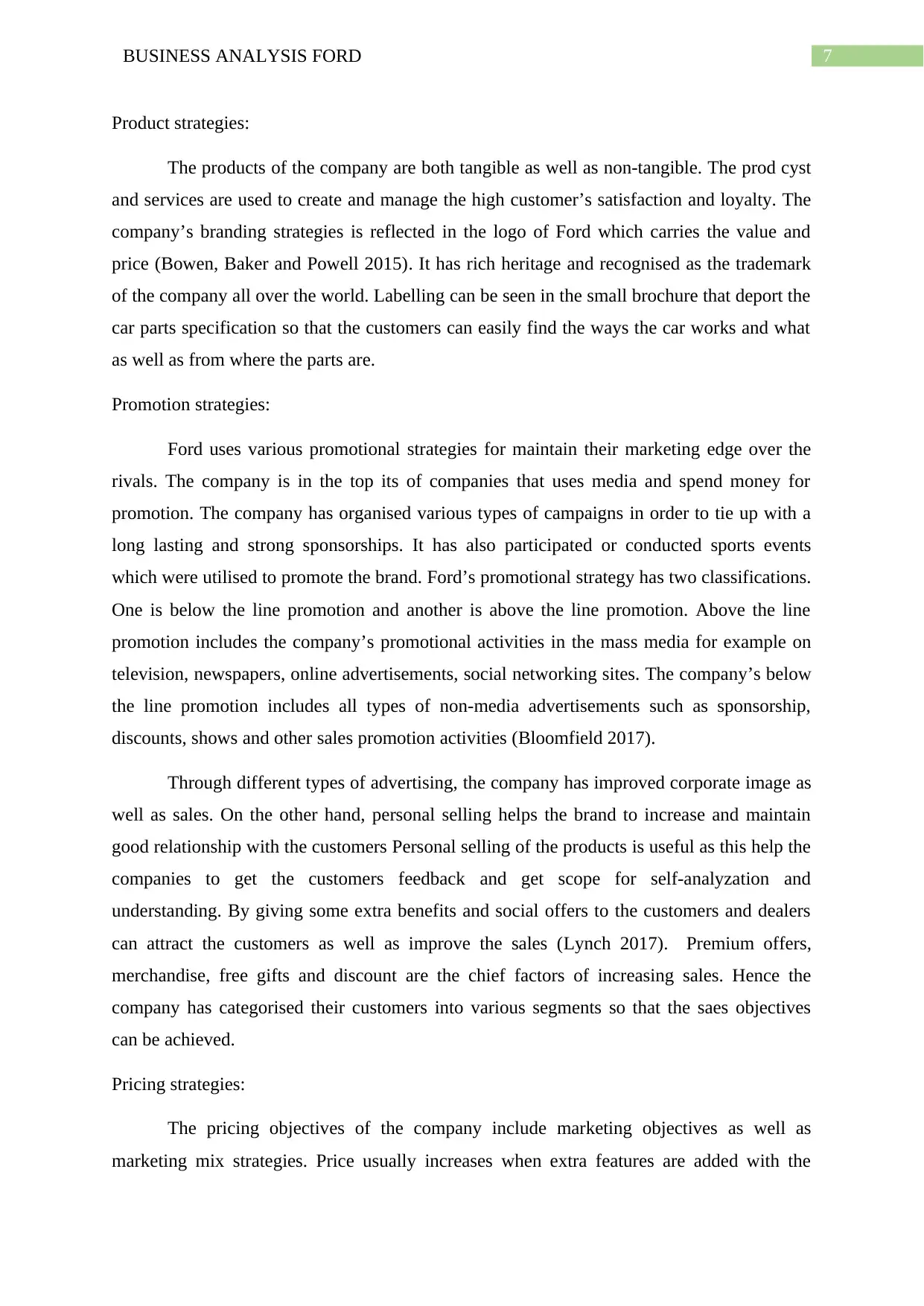
7BUSINESS ANALYSIS FORD
Product strategies:
The products of the company are both tangible as well as non-tangible. The prod cyst
and services are used to create and manage the high customer’s satisfaction and loyalty. The
company’s branding strategies is reflected in the logo of Ford which carries the value and
price (Bowen, Baker and Powell 2015). It has rich heritage and recognised as the trademark
of the company all over the world. Labelling can be seen in the small brochure that deport the
car parts specification so that the customers can easily find the ways the car works and what
as well as from where the parts are.
Promotion strategies:
Ford uses various promotional strategies for maintain their marketing edge over the
rivals. The company is in the top its of companies that uses media and spend money for
promotion. The company has organised various types of campaigns in order to tie up with a
long lasting and strong sponsorships. It has also participated or conducted sports events
which were utilised to promote the brand. Ford’s promotional strategy has two classifications.
One is below the line promotion and another is above the line promotion. Above the line
promotion includes the company’s promotional activities in the mass media for example on
television, newspapers, online advertisements, social networking sites. The company’s below
the line promotion includes all types of non-media advertisements such as sponsorship,
discounts, shows and other sales promotion activities (Bloomfield 2017).
Through different types of advertising, the company has improved corporate image as
well as sales. On the other hand, personal selling helps the brand to increase and maintain
good relationship with the customers Personal selling of the products is useful as this help the
companies to get the customers feedback and get scope for self-analyzation and
understanding. By giving some extra benefits and social offers to the customers and dealers
can attract the customers as well as improve the sales (Lynch 2017). Premium offers,
merchandise, free gifts and discount are the chief factors of increasing sales. Hence the
company has categorised their customers into various segments so that the saes objectives
can be achieved.
Pricing strategies:
The pricing objectives of the company include marketing objectives as well as
marketing mix strategies. Price usually increases when extra features are added with the
Product strategies:
The products of the company are both tangible as well as non-tangible. The prod cyst
and services are used to create and manage the high customer’s satisfaction and loyalty. The
company’s branding strategies is reflected in the logo of Ford which carries the value and
price (Bowen, Baker and Powell 2015). It has rich heritage and recognised as the trademark
of the company all over the world. Labelling can be seen in the small brochure that deport the
car parts specification so that the customers can easily find the ways the car works and what
as well as from where the parts are.
Promotion strategies:
Ford uses various promotional strategies for maintain their marketing edge over the
rivals. The company is in the top its of companies that uses media and spend money for
promotion. The company has organised various types of campaigns in order to tie up with a
long lasting and strong sponsorships. It has also participated or conducted sports events
which were utilised to promote the brand. Ford’s promotional strategy has two classifications.
One is below the line promotion and another is above the line promotion. Above the line
promotion includes the company’s promotional activities in the mass media for example on
television, newspapers, online advertisements, social networking sites. The company’s below
the line promotion includes all types of non-media advertisements such as sponsorship,
discounts, shows and other sales promotion activities (Bloomfield 2017).
Through different types of advertising, the company has improved corporate image as
well as sales. On the other hand, personal selling helps the brand to increase and maintain
good relationship with the customers Personal selling of the products is useful as this help the
companies to get the customers feedback and get scope for self-analyzation and
understanding. By giving some extra benefits and social offers to the customers and dealers
can attract the customers as well as improve the sales (Lynch 2017). Premium offers,
merchandise, free gifts and discount are the chief factors of increasing sales. Hence the
company has categorised their customers into various segments so that the saes objectives
can be achieved.
Pricing strategies:
The pricing objectives of the company include marketing objectives as well as
marketing mix strategies. Price usually increases when extra features are added with the
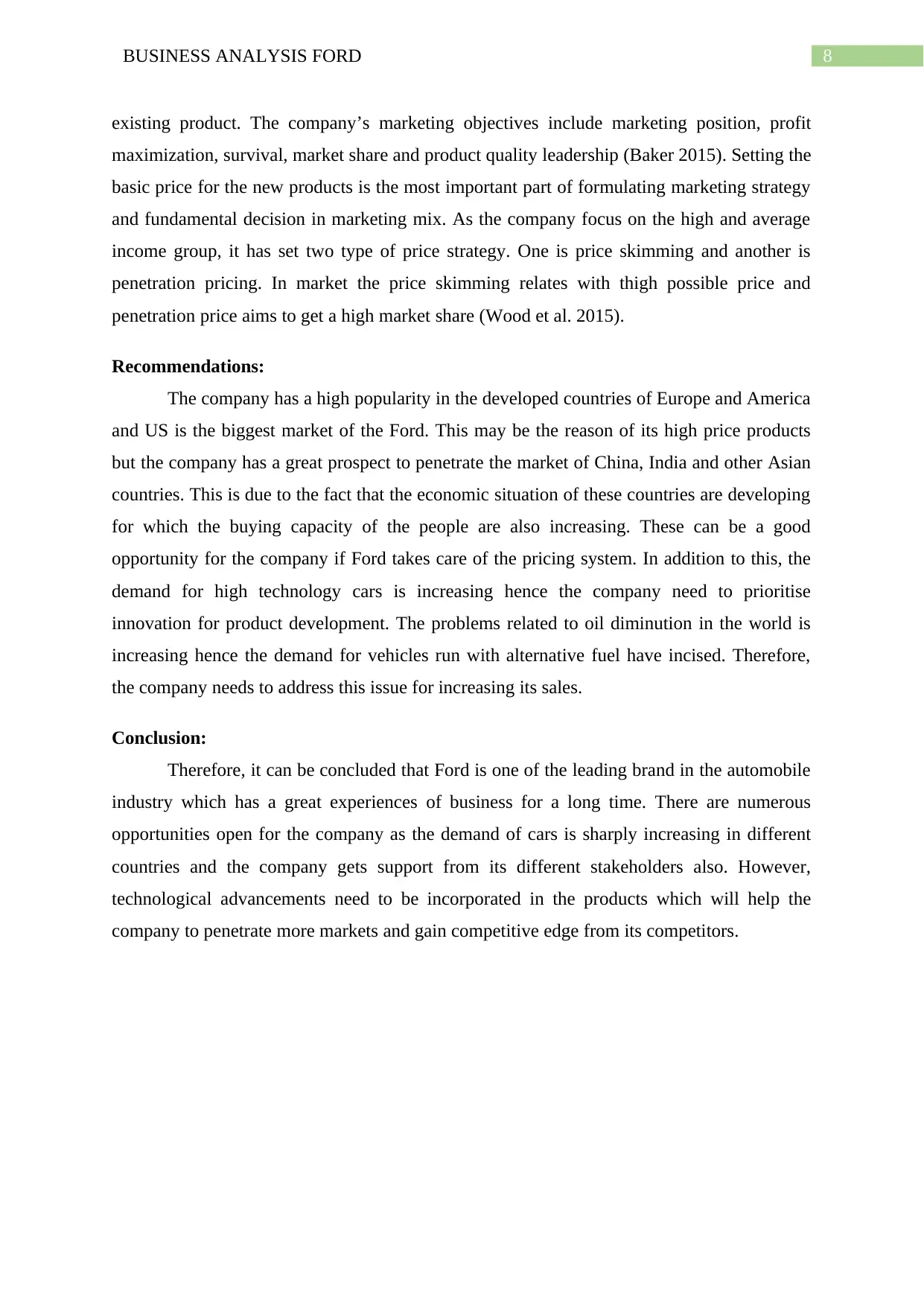
8BUSINESS ANALYSIS FORD
existing product. The company’s marketing objectives include marketing position, profit
maximization, survival, market share and product quality leadership (Baker 2015). Setting the
basic price for the new products is the most important part of formulating marketing strategy
and fundamental decision in marketing mix. As the company focus on the high and average
income group, it has set two type of price strategy. One is price skimming and another is
penetration pricing. In market the price skimming relates with thigh possible price and
penetration price aims to get a high market share (Wood et al. 2015).
Recommendations:
The company has a high popularity in the developed countries of Europe and America
and US is the biggest market of the Ford. This may be the reason of its high price products
but the company has a great prospect to penetrate the market of China, India and other Asian
countries. This is due to the fact that the economic situation of these countries are developing
for which the buying capacity of the people are also increasing. These can be a good
opportunity for the company if Ford takes care of the pricing system. In addition to this, the
demand for high technology cars is increasing hence the company need to prioritise
innovation for product development. The problems related to oil diminution in the world is
increasing hence the demand for vehicles run with alternative fuel have incised. Therefore,
the company needs to address this issue for increasing its sales.
Conclusion:
Therefore, it can be concluded that Ford is one of the leading brand in the automobile
industry which has a great experiences of business for a long time. There are numerous
opportunities open for the company as the demand of cars is sharply increasing in different
countries and the company gets support from its different stakeholders also. However,
technological advancements need to be incorporated in the products which will help the
company to penetrate more markets and gain competitive edge from its competitors.
existing product. The company’s marketing objectives include marketing position, profit
maximization, survival, market share and product quality leadership (Baker 2015). Setting the
basic price for the new products is the most important part of formulating marketing strategy
and fundamental decision in marketing mix. As the company focus on the high and average
income group, it has set two type of price strategy. One is price skimming and another is
penetration pricing. In market the price skimming relates with thigh possible price and
penetration price aims to get a high market share (Wood et al. 2015).
Recommendations:
The company has a high popularity in the developed countries of Europe and America
and US is the biggest market of the Ford. This may be the reason of its high price products
but the company has a great prospect to penetrate the market of China, India and other Asian
countries. This is due to the fact that the economic situation of these countries are developing
for which the buying capacity of the people are also increasing. These can be a good
opportunity for the company if Ford takes care of the pricing system. In addition to this, the
demand for high technology cars is increasing hence the company need to prioritise
innovation for product development. The problems related to oil diminution in the world is
increasing hence the demand for vehicles run with alternative fuel have incised. Therefore,
the company needs to address this issue for increasing its sales.
Conclusion:
Therefore, it can be concluded that Ford is one of the leading brand in the automobile
industry which has a great experiences of business for a long time. There are numerous
opportunities open for the company as the demand of cars is sharply increasing in different
countries and the company gets support from its different stakeholders also. However,
technological advancements need to be incorporated in the products which will help the
company to penetrate more markets and gain competitive edge from its competitors.
⊘ This is a preview!⊘
Do you want full access?
Subscribe today to unlock all pages.

Trusted by 1+ million students worldwide
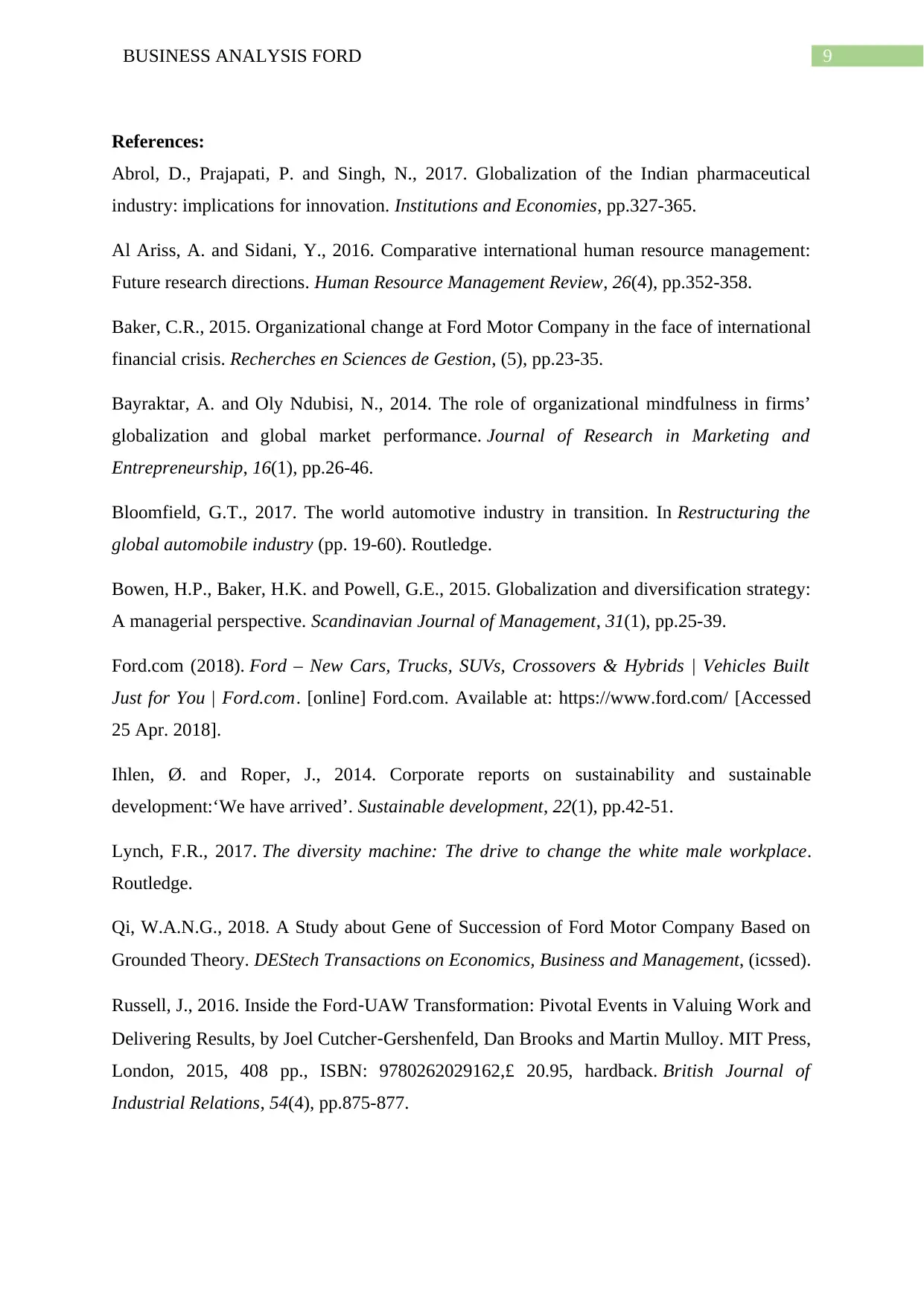
9BUSINESS ANALYSIS FORD
References:
Abrol, D., Prajapati, P. and Singh, N., 2017. Globalization of the Indian pharmaceutical
industry: implications for innovation. Institutions and Economies, pp.327-365.
Al Ariss, A. and Sidani, Y., 2016. Comparative international human resource management:
Future research directions. Human Resource Management Review, 26(4), pp.352-358.
Baker, C.R., 2015. Organizational change at Ford Motor Company in the face of international
financial crisis. Recherches en Sciences de Gestion, (5), pp.23-35.
Bayraktar, A. and Oly Ndubisi, N., 2014. The role of organizational mindfulness in firms’
globalization and global market performance. Journal of Research in Marketing and
Entrepreneurship, 16(1), pp.26-46.
Bloomfield, G.T., 2017. The world automotive industry in transition. In Restructuring the
global automobile industry (pp. 19-60). Routledge.
Bowen, H.P., Baker, H.K. and Powell, G.E., 2015. Globalization and diversification strategy:
A managerial perspective. Scandinavian Journal of Management, 31(1), pp.25-39.
Ford.com (2018). Ford – New Cars, Trucks, SUVs, Crossovers & Hybrids | Vehicles Built
Just for You | Ford.com. [online] Ford.com. Available at: https://www.ford.com/ [Accessed
25 Apr. 2018].
Ihlen, Ø. and Roper, J., 2014. Corporate reports on sustainability and sustainable
development:‘We have arrived’. Sustainable development, 22(1), pp.42-51.
Lynch, F.R., 2017. The diversity machine: The drive to change the white male workplace.
Routledge.
Qi, W.A.N.G., 2018. A Study about Gene of Succession of Ford Motor Company Based on
Grounded Theory. DEStech Transactions on Economics, Business and Management, (icssed).
Russell, J., 2016. Inside the Ford‐UAW Transformation: Pivotal Events in Valuing Work and
Delivering Results, by Joel Cutcher‐Gershenfeld, Dan Brooks and Martin Mulloy. MIT Press,
London, 2015, 408 pp., ISBN: 9780262029162,£ 20.95, hardback. British Journal of
Industrial Relations, 54(4), pp.875-877.
References:
Abrol, D., Prajapati, P. and Singh, N., 2017. Globalization of the Indian pharmaceutical
industry: implications for innovation. Institutions and Economies, pp.327-365.
Al Ariss, A. and Sidani, Y., 2016. Comparative international human resource management:
Future research directions. Human Resource Management Review, 26(4), pp.352-358.
Baker, C.R., 2015. Organizational change at Ford Motor Company in the face of international
financial crisis. Recherches en Sciences de Gestion, (5), pp.23-35.
Bayraktar, A. and Oly Ndubisi, N., 2014. The role of organizational mindfulness in firms’
globalization and global market performance. Journal of Research in Marketing and
Entrepreneurship, 16(1), pp.26-46.
Bloomfield, G.T., 2017. The world automotive industry in transition. In Restructuring the
global automobile industry (pp. 19-60). Routledge.
Bowen, H.P., Baker, H.K. and Powell, G.E., 2015. Globalization and diversification strategy:
A managerial perspective. Scandinavian Journal of Management, 31(1), pp.25-39.
Ford.com (2018). Ford – New Cars, Trucks, SUVs, Crossovers & Hybrids | Vehicles Built
Just for You | Ford.com. [online] Ford.com. Available at: https://www.ford.com/ [Accessed
25 Apr. 2018].
Ihlen, Ø. and Roper, J., 2014. Corporate reports on sustainability and sustainable
development:‘We have arrived’. Sustainable development, 22(1), pp.42-51.
Lynch, F.R., 2017. The diversity machine: The drive to change the white male workplace.
Routledge.
Qi, W.A.N.G., 2018. A Study about Gene of Succession of Ford Motor Company Based on
Grounded Theory. DEStech Transactions on Economics, Business and Management, (icssed).
Russell, J., 2016. Inside the Ford‐UAW Transformation: Pivotal Events in Valuing Work and
Delivering Results, by Joel Cutcher‐Gershenfeld, Dan Brooks and Martin Mulloy. MIT Press,
London, 2015, 408 pp., ISBN: 9780262029162,£ 20.95, hardback. British Journal of
Industrial Relations, 54(4), pp.875-877.
Paraphrase This Document
Need a fresh take? Get an instant paraphrase of this document with our AI Paraphraser
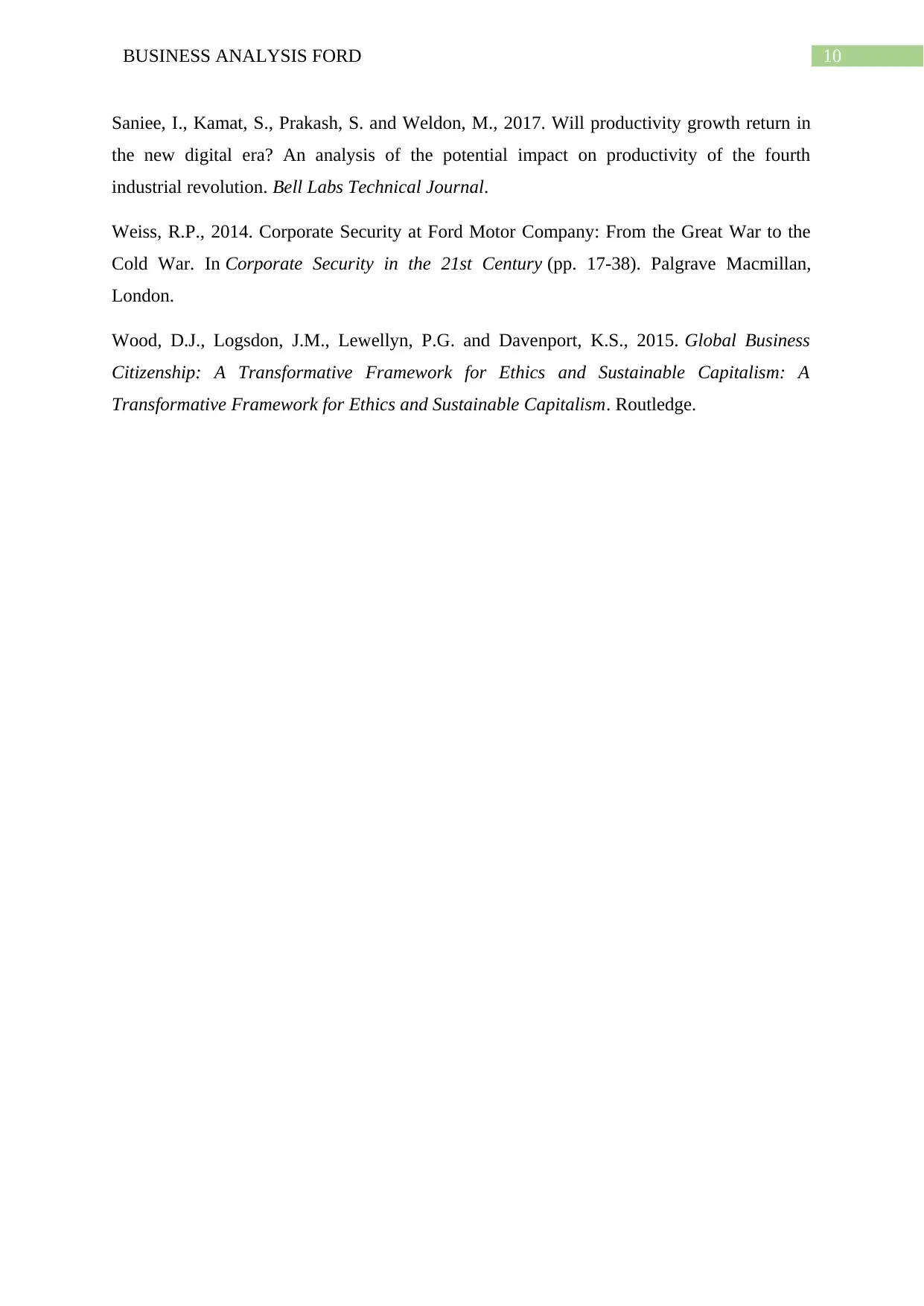
10BUSINESS ANALYSIS FORD
Saniee, I., Kamat, S., Prakash, S. and Weldon, M., 2017. Will productivity growth return in
the new digital era? An analysis of the potential impact on productivity of the fourth
industrial revolution. Bell Labs Technical Journal.
Weiss, R.P., 2014. Corporate Security at Ford Motor Company: From the Great War to the
Cold War. In Corporate Security in the 21st Century (pp. 17-38). Palgrave Macmillan,
London.
Wood, D.J., Logsdon, J.M., Lewellyn, P.G. and Davenport, K.S., 2015. Global Business
Citizenship: A Transformative Framework for Ethics and Sustainable Capitalism: A
Transformative Framework for Ethics and Sustainable Capitalism. Routledge.
Saniee, I., Kamat, S., Prakash, S. and Weldon, M., 2017. Will productivity growth return in
the new digital era? An analysis of the potential impact on productivity of the fourth
industrial revolution. Bell Labs Technical Journal.
Weiss, R.P., 2014. Corporate Security at Ford Motor Company: From the Great War to the
Cold War. In Corporate Security in the 21st Century (pp. 17-38). Palgrave Macmillan,
London.
Wood, D.J., Logsdon, J.M., Lewellyn, P.G. and Davenport, K.S., 2015. Global Business
Citizenship: A Transformative Framework for Ethics and Sustainable Capitalism: A
Transformative Framework for Ethics and Sustainable Capitalism. Routledge.
1 out of 11
Related Documents
Your All-in-One AI-Powered Toolkit for Academic Success.
+13062052269
info@desklib.com
Available 24*7 on WhatsApp / Email
![[object Object]](/_next/static/media/star-bottom.7253800d.svg)
Unlock your academic potential
Copyright © 2020–2026 A2Z Services. All Rights Reserved. Developed and managed by ZUCOL.




